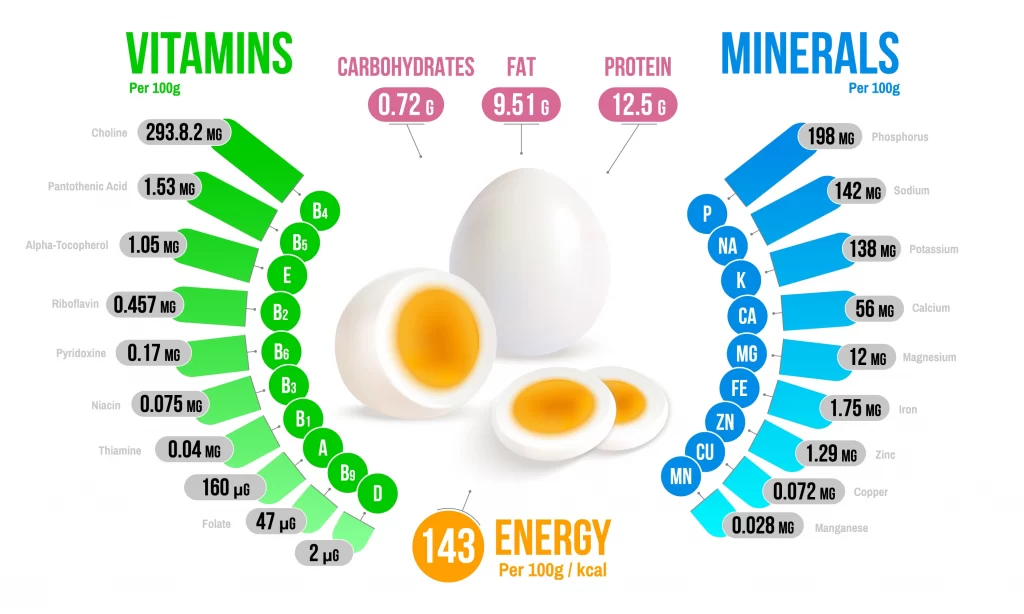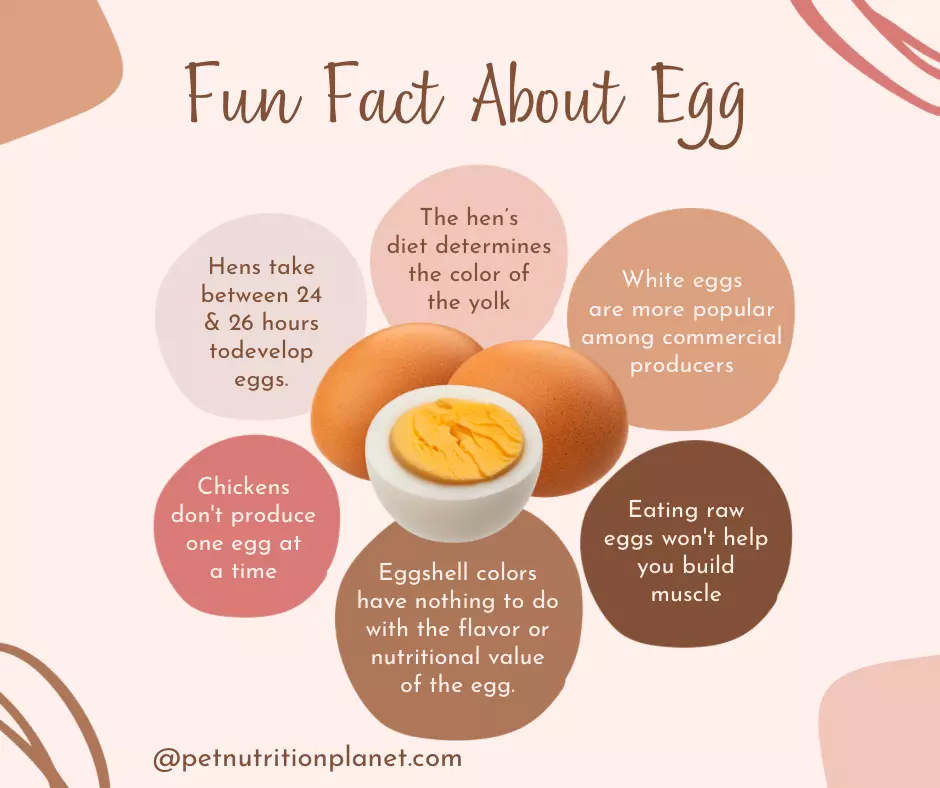If you’re wondering if eggs are good for hamsters, you’re in the right place!
When it comes to diet and nutrition, hamsters are not as simple as one might think. In fact, there are many things that people might not know about hamster eating habits. One question that a lot of hamster owners have is whether or not their little furry friend can eat eggs.
Despite being small, hamsters are actually omnivores, which means that they can eat both plant-based and animal-based foods. This includes eggs, which make a great source of protein for these little rodents.

In this blog post, we will cover everything you need to know about feeding eggs to your hamster. Eggs are a great source of protein and other nutrients that can benefit your hamster’s health. However, it is important to feed eggs in moderation to avoid any potential side effects. We will also provide some tips on how to prepare eggs for your hamsters and introduce them to their diet.

What Are Eggs Exactly?
Before we get into whether or not hamsters can eat eggs, it is important to understand what eggs are exactly. Eggs are an incredible food. They’re cheap, they’re easy to find, they’re versatile, and they’re packed with nutrients. But what exactly are they?
To put it simply, an egg is a single cell that has all the genetic information needed to make a new organism.

Eggs consist of three main parts: the shell, the egg white, and the yolk. The shell is made up of calcium carbonate and protects the egg from bacteria and other contaminants. The egg white is mostly made up of water but also contains protein, vitamins, and minerals. The yolk is where most of the fat and cholesterol in an egg are found. It also contains vitamin A, iron, phosphorus, and other nutrients.
What Are The Nutrients In Eggs?
Eggs are an excellent source of protein and contain all the essential amino acids that your body needs. They’re also a good source of choline, which is important for brain health, and lutein and zeaxanthin, which are important for eye health. Eggs also contain vitamin D, vitamin B12, selenium, and iodine.
In addition to being a great source of nutrients, eggs are also low in calories and fat. A single large egg has only about 80 calories and contains five grams of fat, only two of which are saturated.

Now that we know what eggs are, let’s answer the question: can hamsters eat eggs?
Can Hamsters Eat Eggs?
Yes, hamsters can eat eggs. In fact, eggs are a great source of nutrients for hamsters. They contain high levels of protein, vitamins A and B12, and minerals like zinc and iron. Eggs also have a good balance of omega-3 and omega-6 fatty acids, which are important for the health of your hamster’s skin and coat.
As we mentioned earlier, hamsters are omnivores, which means that they can eat both plant-based and animal-based foods. This includes eggs, which make a great source of protein for these little rodents.

In addition to being a good source of protein, eggs also contain other nutrients that can benefit your hamster’s health. For example, eggs are a good source of choline, which is important for brain health. Eggs are also a good source of lutein and zeaxanthin, which are important for eye health.
Eggs are also low in calories, making them a great choice for hamsters who are trying to lose weight or maintain a healthy weight.
However, it is important to feed eggs to hamsters in moderation. Eggs are high in cholesterol and fat, so feeding too many can lead to obesity and other health problems. It is generally recommended that hamsters have no more than one egg per week.

When feeding eggs to your hamster, it is best to give them cooked eggs, as raw eggs may contain bacteria that can make your hamster sick. Boiled or scrambled eggs are a good option. You can also add some chopped vegetables or fruits to the mix for added nutrition.

List of Egg Benefits for Hamsters:
While human beings have long since realised the benefits of eggs as a source of protein and other nutrients, it turns out that they can be just as beneficial for our smaller furry friends. Here are ten benefits of eggs for hamsters:

1. They’re a great source of protein.
Eggs are an excellent source of protein, which is essential for the growth and repair of tissues in the body. Protein is also necessary for the production of enzymes and hormones.Protein can be found in both the egg white and the yolk. In fact, about two-thirds of an egg’s protein content is in the white.
The protein in eggs is high quality and easily digestible, making it a great option for hamsters.
2. They’re easy to digest.
Hamsters have a relatively short digestive tract, so they need foods that are easy to digest. Eggs fit the bill perfectly. The protein in eggs is also high quality and easily digestible. This means that it’s less likely to cause digestive problems like diarrhea or constipation.
3. They’re packed with nutrients.
Eggs are not only a great source of protein, but they’re also packed with other nutrients that can benefit your hamster’s health. For example, eggs contain high levels of vitamins A and B12, as well as minerals like zinc and iron. Eggs also have a good balance of omega- three and omega- six fatty acids, which are important for the health of your hamster’s skin and coat.
4. They’re easy to find.
Eggs are a common food item, so they’re easy to find and relatively inexpensive. Unlike some other hamster foods that can be hard to find in stores, eggs are readily available at most supermarkets.
If you have your own chickens, you can also feed your hamster fresh eggs from your own flock.Just be sure to wash the eggs thoroughly before feeding them to your hamster to remove any dirt or bacteria.
5.They’re inexpensive:
As we mentioned, eggs are relatively inexpensive, especially if you have your own chickens. Eggs are very affordable, especially when compared to other sources of protein like meat or fish.A dozen eggs can cost very little,making them a budget-friendly option for hamster owners.
Plus, since eggs are packed with nutrients, you don’t need to feed your hamster as much as other food to meet their nutritional needs. This can also help save money in the long run.
6.They have a long shelf life.
Another great thing about eggs is that they have a long shelf life. When stored properly, fresh eggs can last for several weeks. This makes them a convenient food to keep on hand in case of emergencies.
If you live in an area with power outages or other natural disasters, eggs can be a lifesaver. Just be sure to rotate them so that you’re using the oldest ones first and always keep fresh eggs on hand.
7.They’re easy to prepare.
Eggs are very easy to prepare, and there are many different ways to cook them for your hamster. You can hard-boil them, scramble them, or even make omelets. This makes eggs a versatile food that can be used in many different hamster recipes.
8.They’re good for bonding.
Feeding your hamster eggs can also be a great way to bond with them. Many hamsters enjoy being hand-fed, and eggs are the perfect food for this. Plus, since they’re so packed with nutrients, you can feel good about giving your hamster a healthy treat that will benefit their health.
9.They can boost immune system .
Eggs are a great source of nutrients like vitamin A and zinc, both of which can help boost your hamster’s immune system. A strong immune system is important for preventing illness and keeping your hamster healthy.
10.They can help with weight gain.
If your hamster is underweight, eggs can be a great way to help them put on some extra pounds. Just be sure not to overfeed them, as this can lead to obesity. Eggs are very high in calories, so a little goes a long way when it comes to feeding them to your hamster.
These are just some of the benefits of feeding eggs to your hamster. As you can see, eggs are a nutritionally dense food that can provide many benefits for your hamster’s health. If you’re looking for a healthy, affordable, and easy-to-find food option for your hamster, eggs are a great option.
Just be sure to introduce them slowly into your hamster’s diet to avoid any digestive problems. And, as always, if you have any concerns about your hamster’s health, be sure to consult with a veterinarian.

Too Many Eggs Have Negative Effects On Hamsters:
While eggs are a great source of nutrition for hamsters, it’s important to remember that they should be fed in moderation. Like all foods, there can be some side effects if your hamster eats too many eggs.
As any pet owner knows, it’s important to stick to a healthy diet for your furry friend. This is especially true for hamsters, who are prone to obesity and other health problems. While an occasional egg can be a healthy treat, feeding your hamster too many eggs can lead to some serious side effects. Here are seven of the most common:
- 1. Diarrhea: Too many eggs can lead to gastrointestinal distress and diarrhea in hamsters.
- 2. Fatty liver disease: A diet high in fat can cause a build-up of triglycerides in the liver, leading to fatty liver disease. This can be fatal if left untreated.
- 3. Pancreatitis: Eggs are also high in cholesterol, which can lead to pancreatitis, or inflammation of the pancreas. This is a serious condition that can be life-threatening.
- 4. Obesity: As mentioned earlier, hamsters are prone to obesity, and a diet high in eggs can contribute to this problem. Obesity can lead to a host of other health problems, including diabetes and joint problems.
- 5. Heart disease: A diet high in cholesterol can also lead to heart disease in hamsters. This is a serious condition that can be fatal if left untreated.
- 6. Kidney disease: Eggs are high in protein, which can put a strain on the kidneys. This can lead to kidney disease, which is a serious condition that can be fatal if left untreated.
- 7. Allergies: Some hamsters may be allergic to eggs, which can lead to a variety of symptoms, including diarrhea, vomiting, and difficulty breathing. If your hamster has any of these symptoms after eating eggs, it’s important to take them to the vet immediately.
As you can see, there are some serious side effects that can occur if your hamster eats too many eggs. If you’re concerned that your hamster may be eating too many eggs, it’s important to talk to your veterinarian. They can help you determine if your hamster is getting too much of this food and recommend a healthier diet for them.

How Many Eggs Can Hamsters Eat?
Now that we know the potential side effects of feeding eggs to hamsters, it’s important to understand how many they can eat. While eggs are a healthy food for hamsters, they should be fed in moderation.
A good rule of thumb is to feed your hamster a maximum of one egg per week, divided into multiple feeding sessions. This will help ensure that they’re getting the nutrients they need without overdoing it on the cholesterol and fat.If you have multiple hamsters, you can increase the quantity of egg you feed them accordingly.

It’s also important to keep in mind that not all hamsters will be able to tolerate eggs equally. Some may be more sensitive to the side effects than others. If you notice any adverse reactions in your hamster after feeding them eggs, it’s important to stop feeding them this food and talk to your veterinarian.
How Many Eggs Can Syrian Hamsters Eat?
The answer, surprisingly, is not as many as you might think. While Syrian hamsters are the largest pet hamster species and are known for their love of food, they can actually only eat a maximum of one egg per week.
If you’re planning on feeding your Syrian hamster an egg, it’s best to spread it out over multiple feeding sessions rather than give them the whole egg at once.
Hamsters have sensitive stomachs, and too much food can lead to health problems. So while they may beg for more, it’s important to stick to the recommended amount. An egg once a week is a healthy treat that your Syrian hamster will enjoy without putting their health at risk.
How Many Eggs Can Roborovski hamster have?
Roborovski hamsters are a smaller pet hamster species than Syrians , and as such, they can only eat a maximum of half an egg per week. This should be divided into multiple feeding sessions to ensure that they’re getting the nutrients they need without overdoing it on the cholesterol and fat.
As with other hamsters, too much food can lead to health problems in Roborovski hamsters. If you notice any adverse reactions in your hamster after feeding them eggs, it’s important to stop feeding them this food and talk to your veterinarian.

What To Do If Your Hamster Has Eaten Too Many Eggs?
If your hamster has eaten too many eggs, don’t panic! While it’s not ideal for them to overindulge, its probably won’t be fatal to them. However, there are a few things you can do to help them (and you) out.
- First, offer them some fresh vegetables or fruit as a way to get some of the extra cholesterol out of their system.
- Secondly, make sure they have plenty of water to drink to help flush the excess cholesterol out of their system.
- Finally, cut back on the number of eggs you’re feeding them going forward so they don’t make this mistake again!
If you follow these steps, your hamster will be back to their healthy self in no time.

When To Take Your Hamster To The Vet?
If you’re concerned that your hamster is eating too many eggs, it’s important to talk to your veterinarian. They can help you determine if your hamster is getting too much of this food and recommend a healthier diet for them.
They can also help you troubleshoot any other health problems that may be occurring. If you notice any of the following symptoms in your hamster, it’s important to take them to the vet immediately:
- Diarrhea
- Vomiting
- Difficulty breathing
- lethargy
- Loss of appetite
These are just a few of the potential health problems that can occur in hamsters who eat too many eggs. If you’re concerned about your hamster’s health, it’s important to talk to your veterinarian. They can help you determine if eggs are the cause of the problem and recommend a course of treatment.
How To Prepare Eggs For Your Hamsters?
If you decide to feed your hamster eggs, it’s important to prepare them properly. Raw eggs can contain bacteria that can be harmful to your hamster, so they should always be cooked before feeding them.
The best way to cook eggs for your hamster is to hard-boil them. This will kill any harmful bacteria and make them safe for your hamster to eat.

To hard-boil an egg, simply place it in a pot of boiling water and let it cook for about ten minutes. Once the egg is cooked, remove it from the water and let it cool before giving it to your hamster.
How To Introduce Eggs Into Your Hamsters Diet?
If you’re introducing eggs into your hamster’s diet for the first time, it’s important to do so slowly. Start by giving them a small piece of hard-boiled egg once a week and observe their reaction.
If they seem to tolerate it well, you can gradually increase the amount of egg you give them each week. However, if they have any adverse reactions, such as diarrhea or vomiting, stop feeding them eggs immediately and talk to your veterinarian.


Can Hamsters Eat Raw Eggs?
No, hamsters cannot eat raw eggs. In fact, doing so could make them very ill. Raw eggs may contain harmful bacteria that can cause food poisoning in people, and the same is true for hamsters.
Additionally, raw eggs contain a substance called avidin, which can prevent the absorption of biotin. Biotin is an important vitamin that helps to keep fur healthy and prevent skin problems. Without enough biotin, hamsters can develop scaly skin and runny eyes.
For these reasons, it’s best to avoid giving your hamster raw eggs. If you want to give them a protein-rich treat, consider hard-boiling an egg instead.
Can Hamsters Eat Boiled Eggs?
Yes, hamsters can eat boiled eggs. Boiled eggs are a good source of protein and other nutrients that can be beneficial for hamsters. In fact, many commercial hamster foods contain boiled eggs as an ingredient.
Additionally, boiling an egg kills any harmful bacteria that may be present. This makes them safe for your hamster to eat and helps to prevent food poisoning.
If you decide to give your hamster a boiled egg, make sure it is fully cooked before giving it to them. Also, let the egg cool down all the way before giving it to your hamster so it doesn’t get burned.
Can Hamsters Eat Egg White?
Yes, hamsters can eat egg white. In fact, many experts recommend that hamsters include egg white in their diet as it is a good source of protein. However, there are a few things to keep in mind when feeding your hamster egg white.
First of all, make sure that the egg is cooked thoroughly, as a raw egg can contain bacteria that can make your hamster sick. Secondly, only give your hamster a small amount of egg white at a time, as too much can cause digestive problems.
Finally, remember to remove the eggshell before giving the egg white to your hamster, as eating the shell can cause impaction.
If you follow these simple guidelines, then your hamster will be able to enjoy a healthy and nutritious meal.
Can Hamsters Eat Egg Yolk?
Yes, hamsters can eat egg yolks – but it’s important to give them cooked yolks, rather than raw ones. Raw egg yolks can be dangerous for hamsters, as they may contain bacteria that can make your pet sick.
However, cooked yolks are a perfectly nutritious treat for your furry friend. They’re a good source of protein and fat, and they can help to keep your hamster’s coat healthy and glossy.
Another thing to remember is to give egg yolk in moderation. Too much egg yolk can cause digestive problems and health issues in hamsters, so it’s best to give them only a small amount at a time.
Can Hamsters Eat Scrambled Eggs?
Yes, hamsters can eat scrambled eggs! In fact, many hamster owners report that their pets love this particular dish. Just be sure to scramble the eggs well and cut them into small pieces before serving, as hamsters have difficulty digesting whole eggs.
Also, avoid adding salt or other spices to the eggs, as these can be harmful to your furry friend. Enjoy!
Can Hamsters Eat Fried Eggs?
No, hamsters should not eat fried eggs. Fried eggs are high in fat and cholesterol, which can be harmful to your furry friend. Additionally, fried eggs may contain harmful chemicals that can be toxic to your pet.
If you want to give your hamster a protein-rich treat, consider hard-boiling an egg instead.
Can Hamsters Eat Egg Shells?
No, hamsters should not eat egg shells. Egg shells are sharp and can cut your hamster’s mouth or digestive tract. Additionally, egg shells may contain harmful bacteria that can make your pet sick.
The only way feeding egg shells to your hamsters is acceptable is if you finally powder or grind the egg shells and mix the powder with your hamsters food.

Final Verdict :Can Hamsters Eat Eggs?
Yes,Hamsters can eat eggs in moderation, but it’s important to make sure that the eggs are cooked properly first. Eggs are a good source of protein and other nutrients that hamsters need, so they can be a healthy part of your hamster’s diet.
In fact, eggs are a great source of protein for hamsters, and they can even help to keep your pet’s coat looking healthy and shiny.
Just make sure not to give your hamster too many eggs at once, or else they may end up with an upset stomach.
I hope this blog post has answered any nutrition related questions you had about whether hamsters can eat eggs or not ! If there is anything else I didn’t cover in detail or if you still have more specific questions on this topic, feel free to reach out with your concerns by clicking the contact button below.
Do you have a question about your pet?
Petnutritionplanet is here to help. We are a team of experts in the field of pet nutrition and we are dedicated to helping you keep your pet healthy and happy. Whether you are wondering what food is best for your Dog,Cat, Ferret,Rabbit,Guinea Pigs or you need help with a specific health issue, we can provide the information you need.
Contact us today by leaving your questions at “Ask A Question” segment and let us help you make the best choices for your beloved pet.
Woof Woof For Now 😉
XoXo
Genie
